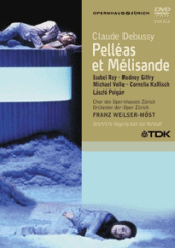Of course the opera has its fans and
has long established itself in the repertory. However, it is very far from a
crowd-pleaser, and the typical company that programs it is wont to pack the
rest of the season with favorites such as
Aida, Boheme, and
Carmen. Director Sven-Eric Bechtolf, set
designer Rolf Glittenberg, and conductor Franz Welser-Most have collaborated
to produce a taut, ominous, and even propulsive account that, despite the
referenced off-putting moments, strips the "airy" from the "fairy-tale"
aspects of Maeterlinck's story and allows the characters to operate both on a
symbolic level and as flesh and blood humans. That success trumps the
niggling complaints, no matter how unavoidable they may be.
The staging emphasizes chillness - white as in ever-present snow, gray as in
the metallic wall at the rear of the uni-set, and frosty gray-blues as in the
costumes of the adult male characters. Mélisande, Yniold and Genevieve get
deeper blues. Paradoxically, this cold environment heightens the seething
passions below the characters' placid outward appearances.
The most controversial element of the production, the use of mannequins
designed to resemble closely the singers for each role, is a risky move that
pays off in many scenes - but also provides a few questionable moments. These
doubles serve to reinforce the characters' misperceptions and obliviousness
of others, and also toward themselves. Often characters sing to the double
while the person actually being addressed is preoccupied elsewhere. For the
most part, this does heighten the pathos of the situations. But oh, how one
wishes Golaud did not take the head of the Yniold doll and place it on the
roof of a car to "spy" on Pelléas and Mélisande. Or that Golaud did not walk
off stage at one point and drag on the inanimate double of Pelléas. And
touching on other directorial inspirations, did Mélisande really have to get
her caught in the car door of the sedan that serves as her tower? Instead of
panic as Golaud approaches, all one can think is "ouch!"
Taken as a whole, however, the conceit must be credited as something
essential to the brooding power and forward momentum of this production.
When Pelléas and Mélisande finally let down their defenses and express their
love to each other, no doubles are visible. They have stripped away the
facade that life with Golaud had forced upon them, and the tenderness they
show each other makes the conclusion all the more shattering. At the end, it
is the "doll" Mélisande that Golaud grieves over - the "real" Mélisande
gambols away, playing with a golden ball that Yniold had lost earlier.
Welser-Most's conducting may be controversial for some adherents of a
mistier, softer reading of the score. Here the rhythms are crisp, even
emphatic at times, and a forward pulse like an impassioned heartbeat makes
itself felt. The fine Zurich orchestra plays with real distinction. This
urgent musical support matches the staging's impetus brilliantly.
If no member of the cast delivers a vocal performance of the highest
standard, each of them sings and acts with dedication and a commitment to the
director's vision, without which the staging would not hold together. Isabel
Rey may not have the slim physique or ethereal appeal of some Mélisande's,
but she is fully within the character, and her well-supported delivery makes
her character less of an enigma or male fantasy. In fine voice, Rod Gilfry
has all the notes and the physical appeal of a believable Pelléas, and he
earns the title billing: this is his tragedy as well. The central character,
however, is Golaud. Michael Volle never gets beyond the character's dark
obsessiveness, and without at least some empathy for this sad man, Golaud
becomes almost a movie character villain. Perhaps a little more softness and
color in the voice would have helped.
Often confined to a wheelchair, László Polgár's Arkel manages to be both
helpless to stop the unfolding tragedy and a warm presence in this frigid
world. Eva Liebau doesn't have to struggle to appear boyish as Yniold, since
the abstract nature of the production doesn't call for realism. Thus we can
relish the ease and beauty of her voice, and firmer intonation than a child
singer can usually provide.
As always with any non-traditional production, viewers who already know they
have a preference for a staging which strictly adheres to the original
libretto's dictates would not find much to enjoy here. For all others, and
especially those who have found Debussy's masterpiece slow-going in the past,
this Zurich production, despite the above-mentioned caveats, may be one that
will open up the dark magic of
Pelléas and
Mélisande to them.
Chris Mullins
Los Angeles Unified School District, Secondary Literacy
